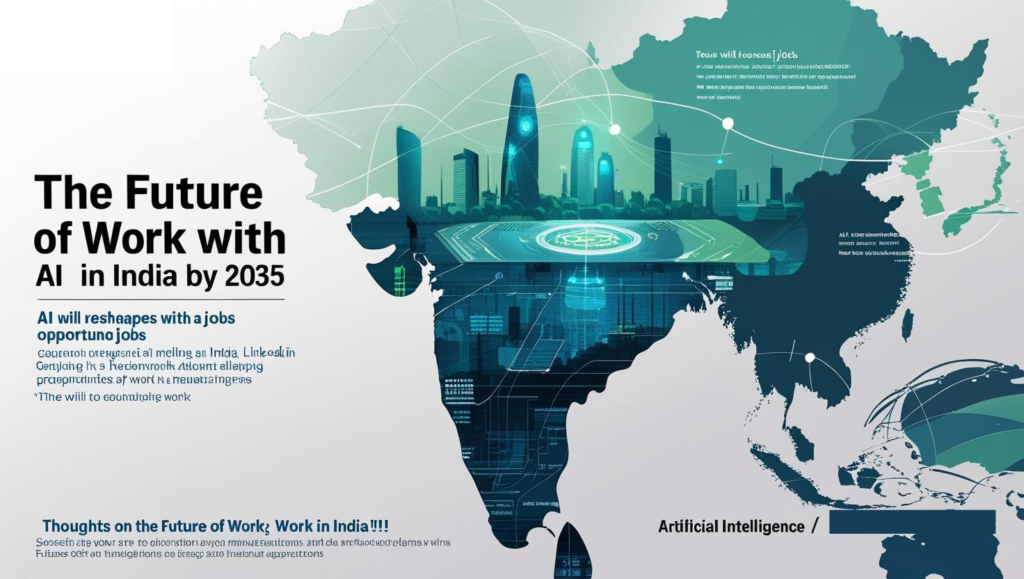
Introduction – India’s evolving job market in the age of AI
India is standing at the edge of a monumental workforce transformation. With over 500 million workers, the country has the second-largest labor force in the world, but the future of work with AI in India is rewriting traditional career paths. By 2035, Artificial Intelligence (AI) is expected to add nearly $1 trillion to India’s economy, while simultaneously reshaping industries, skills, and job roles.
As AI adoption accelerates across IT, healthcare, education, finance, and retail, the fear of job loss is real, but so are the opportunities. According to NASSCOM, while automation may replace some repetitive roles, AI is set to create new job categories and careers that never existed before. At AixCircle, we believe the future of work with AI in India is less about job elimination and more about job transformation.
AI-Driven Automation – Jobs at Risk and Roles Being Transformed
Automation has already made its way into back-office operations, manufacturing, banking processes, and retail supply chains. The automation and AI employment trends in India show that repetitive, rule-based roles such as data entry clerks, telemarketers, and routine customer service agents are at the highest risk.
However, instead of a blanket job loss scenario, AI is transforming roles rather than eliminating them. For example:
- Banking: AI chatbots now handle routine customer queries, but human employees are focusing on financial advisory services.
- Healthcare: AI tools assist doctors with medical imaging, but the final diagnosis and empathy-driven patient care remain human-driven.
- Retail: Smart AI-driven supply chain optimization reduces manual tracking jobs, but creates demand for logistics AI analysts.
Thus, while automation replaces repetitive work, it opens doors for AI-driven jobs and careers in 2035 that require critical thinking, creativity, and human judgment.
New Careers Created by AI – AI trainers, prompt engineers, data ethicists
The future of work with AI in India is not just about job losses—it’s about job creation in new fields. Emerging careers include:
- AI Trainers – Professionals who train AI models with accurate data inputs.
- Prompt Engineers – Specialists in creating the right prompts for generative AI tools like ChatGPT or Bard.
- Data Ethicists – Experts ensuring AI is developed and used responsibly in compliance with ethical standards.
- AI-Powered Healthcare Specialists – Professionals using AI to detect diseases earlier and optimize treatments.
- Smart Manufacturing Engineers – Experts leveraging AI-driven robotics for precision manufacturing.
Reports suggest that by 2035, India will see the rise of millions of AI-driven jobs and careers, bridging the gap between technology and human expertise.
Reskilling & Upskilling – The Rise of AI-Driven Learning Platforms in India
For India to embrace AI disruption positively, reskilling for artificial intelligence in India is essential. Today, several EdTech and corporate platforms are enabling this shift:
- AI-powered adaptive learning platforms like upGrad and Coursera use machine learning to customize courses for individual learners.
- Corporate reskilling programs by Infosys, Wipro, and TCS are equipping employees with AI, machine learning, and data analytics skills.
- Government initiatives like Skill India and National AI Portal provide free access to AI-based learning resources.
By 2035, reskilling will no longer be optional—it will be a mandatory career strategy. AixCircle highlights that reskilling for artificial intelligence in India will determine how well the workforce adapts to the evolving economy.
Industry-Wise Impact – IT, Finance, Healthcare, Retail, Education
The artificial intelligence in workplace transformation is not industry-agnostic. Let’s explore sector-wise impacts:
- IT & Software: AI code generators, DevOps automation, and cloud AI will replace routine coding tasks, but software engineers will shift toward AI integration and cybersecurity.
- Finance: Fraud detection, AI-based investment advisory, and predictive credit scoring will reshape roles in banking.
- Healthcare: AI-assisted diagnosis, robotic surgeries, and predictive analytics will dominate hospitals by 2035.
- Retail: Personalized shopping recommendations, automated warehouses, and AI-driven customer experience will redefine consumer engagement.
- Education: AI tutors, smart classrooms, and adaptive learning platforms will transform how Indian students learn.
Every industry will face automation and AI employment trends in India, but the net effect will be new hybrid human-AI roles.
Case Studies – Indian Companies Embracing AI Workforce Integration
- Infosys – Launched an AI-first reskilling initiative for its 300,000+ employees, making it one of the largest workforce AI adaptation programs globally.
- Apollo Hospitals – Leveraging AI for early cancer detection and predictive patient analytics.
- HDFC Bank – Using AI chatbots to handle 90% of customer interactions, freeing human staff for relationship management.
- Flipkart – Implementing AI for inventory forecasting and customer personalization.
These success stories reflect how AI-driven jobs and careers 2035 will not replace humans, but redefine how they work.
Policy & Government Role – Skilling India’s Workforce for AI 2035
Government policies will play a decisive role in shaping the future of work with AI in India. Key initiatives include:
- National Strategy on Artificial Intelligence (NITI Aayog) – Focused on healthcare, agriculture, and education AI applications.
- Skill India Mission – Integrating AI-driven reskilling programs across states.
- Digital India – Expanding digital literacy and creating AI-ready infrastructure.
The government must also establish AI ethics and regulation frameworks to balance innovation with responsibility. This includes protecting workers displaced by automation while encouraging new career opportunities.
Conclusion – AI as a Partner, Not a Threat
By 2035, the future of work with AI in India will not be defined by machines replacing humans, but by humans working alongside AI. With the right policies, reskilling programs, and industry collaboration, India can turn AI disruption into an opportunity—not just for economic growth, but for inclusive development.
At AixCircle, we envision a future where AI acts as a career catalyst, creating smarter, more fulfilling jobs, and empowering India to lead the global workforce transformation.

